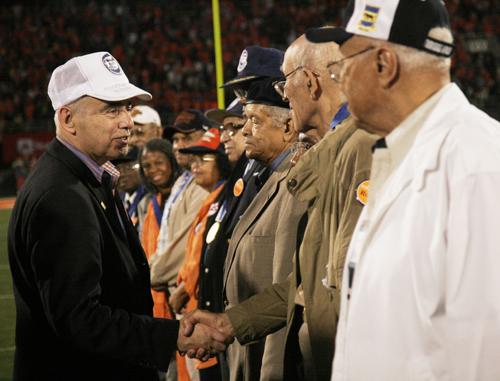University honors Airmen at weekend ceremony

Sep 10, 2007
Last updated on May 12, 2016 at 03:29 p.m.
The University honored the Tuskegee Airmen, a highly specialized division of the Army Air Corps during World War II, this weekend with a ceremony Friday afternoon and during the halftime of Saturday’s football game. Formally awarded the Congressional Medal of Honor in March, the regiment was comprised entirely of black men. They were trained the same way other enlisted pilots were.
In the earliest days of the unit, men were trained in mechanics and pilots flew out of Chanute Air Force Base in Rantoul, Ill. The University thought it was about time these pilots, including some University alumni, were recognized.
“The Tuskegee Airmen were the first African-Americans in the Army Air Corps,” said Michele Thompson, secretary of the Board of Trustees. “The armed forces were segregated at the time and the Tuskegee Airmen were a segregated unit that flew with regular pilots to separate places. They did not get much attention despite their excellent records and participation in the war.”
Get The Daily Illini in your inbox!
At the time, black men were believed not to be smart enough, not to have enough dexterity and to be too afraid to face death. After the second mission came back safely, people started to think differently.
The Tuskegee Airmen were later requested for the last flight over Berlin because of their impeccable record of few casualties.
Eunice Dansby Gingrey attended the ceremony on behalf of her late first husband, Ellsworth Dansby. Dansby had been flying planes since the age of 12. At 27, he was deemed too old to fly, so he became line chief and boss of mechanics while serving in the 99th Pursuit Squadron in Rantoul, Ill.
Although Gingrey did not meet her husband until 1947, she vividly recalls the stories he told her about his time in the service.
While flying in the area of North Africa around 1943, Dansby and some of his crew were invited by local native peoples to have dinner, similar to an honorary ceremony, Gingrey recalled. Dansby and his crew were offered the best delicacy the native people could give them, sheep’s eyes. Dansby did not want to eat the eyes, but felt that he could not refuse the gesture. After much difficulty crossing a language barrier, Dansby conveyed that it was against his religious beliefs to eat the delicacy.
“It’s high time (the Tuskegee Airmen) received recognition,” Gingrey said. “I’m just glad it’s happening while some are still alive and can appreciate it.”
Harvey Alexander, a University alumnus, began his undergraduate degree in 1941 and enrolled in the armed forces despite much advice against it.
“I knew I was going to have to serve,” Alexander said. “Blacks have served in every war and haven’t missed a single one.”
Alexander’s decision to enlist was influenced by his father who served in World War I, but his decision to become a pilot was based on the pay rate.
“Being a pilot paid one and a half times as much as the regular rate,” Alexander said. “But I took to flying like I was born to (do it).”





